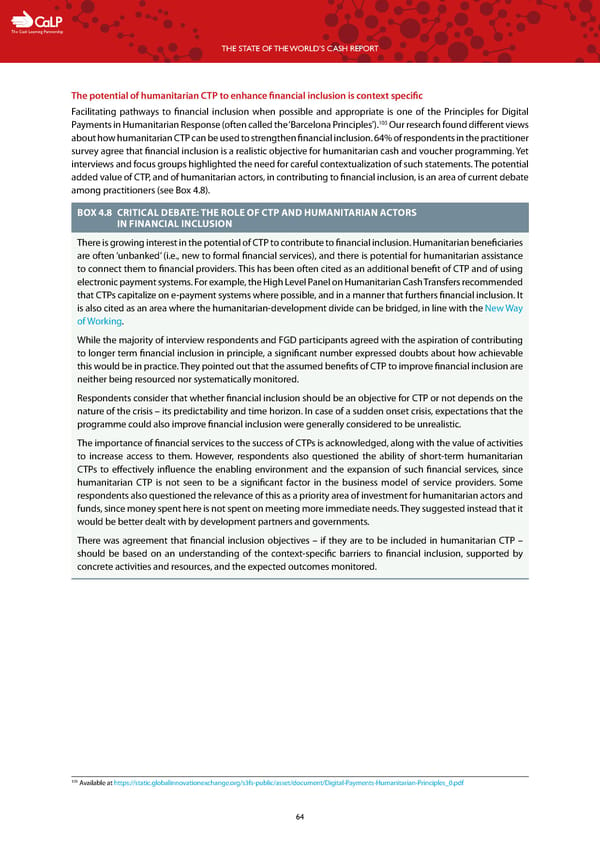C The Cash Learning Partnership THE STATE OF THE WORLD’S CASH REPORT The potential of humanitarian CTP to enhance financial inclusion is context specific Facilitating pathways to financial inclusion when possible and appropriate is one of the Principles for Digital 103 Payments in Humanitarian Response (often called the ‘Barcelona Principles’). Our research found different views about how humanitarian CTP can be used to strengthen financial inclusion. 64% of respondents in the practitioner survey agree that financial inclusion is a realistic objective for humanitarian cash and voucher programming. Yet interviews and focus groups highlighted the need for careful contextualization of such statements. The potential added value of CTP, and of humanitarian actors, in contributing to financial inclusion, is an area of current debate among practitioners (see Box 4.8). BOX 4.8 CRITICAL DEBATE: THE ROLE OF CTP AND HUMANITARIAN ACTORS IN FINANCIAL INCLUSION There is growing interest in the potential of CTP to contribute to financial inclusion. Humanitarian beneficiaries are often ‘unbanked’ (i.e., new to formal financial services), and there is potential for humanitarian assistance to connect them to financial providers. This has been often cited as an additional benefit of CTP and of using electronic payment systems. For example, the High Level Panel on Humanitarian Cash Transfers recommended that CTPs capitalize on e-payment systems where possible, and in a manner that furthers financial inclusion. It is also cited as an area where the humanitarian-development divide can be bridged, in line with the New Way of Working. While the majority of interview respondents and FGD participants agreed with the aspiration of contributing to longer term financial inclusion in principle, a significant number expressed doubts about how achievable this would be in practice. They pointed out that the assumed benefits of CTP to improve financial inclusion are neither being resourced nor systematically monitored. Respondents consider that whether financial inclusion should be an objective for CTP or not depends on the nature of the crisis – its predictability and time horizon. In case of a sudden onset crisis, expectations that the programme could also improve financial inclusion were generally considered to be unrealistic. The importance of financial services to the success of CTPs is acknowledged, along with the value of activities to increase access to them. However, respondents also questioned the ability of short-term humanitarian CTPs to effectively influence the enabling environment and the expansion of such financial services, since humanitarian CTP is not seen to be a significant factor in the business model of service providers. Some respondents also questioned the relevance of this as a priority area of investment for humanitarian actors and funds, since money spent here is not spent on meeting more immediate needs. They suggested instead that it would be better dealt with by development partners and governments. There was agreement that financial inclusion objectives – if they are to be included in humanitarian CTP – should be based on an understanding of the context-specific barriers to financial inclusion, supported by concrete activities and resources, and the expected outcomes monitored. 103 Available at https://static.globalinnovationexchange.org/s3fs-public/asset/document/Digital-Payments-Humanitarian-Principles_0.pdf 64
 The State of the World's Cash | Full Report Page 65 Page 67
The State of the World's Cash | Full Report Page 65 Page 67